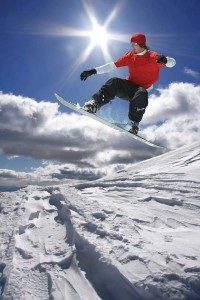
Exercise is vital for everyone, regardless of their current level of fitness or interest in physical activity. It is important that everyone have some form of physical activity each day, and even more important for that physical activity to be meaningful and relevant to their needs.
It is also necessary for all non-native English speakers with an interest in studying or working in the United States to learn English. Learning can begin at any point, regardless of an individual’s current level of proficiency. People often wonder about the best way to learn a new language. As long as the learning method is relevant, the learner is motivated, and the learner has opportunities to practice what is being learned, the specific method is much less important.
Everyone agrees that it is important for visitors to a country to learn some of the local language, but what if students don’t have the language skills necessary to fully participate in skiing classes or fully converse with resort staff? How can ski resorts make these guests feel welcome while also respecting their language challenges?
Bilingual ski instructors are an excellent way to offer students ski instruction while valuing their language and culture. It is truly meaningful when a student from another country learns he is not expected to necessarily be able to speak the local language at the same level as a native speaker, and your staff show respect for a student’s culture and language by offering skiing classes in more than one language.
By taking the time to learn a foreign language like Spanish or French, your resort and staff open the door to a greater number of potential skiers and their families and are seen as a ski resort that cares about all skiers, regardless of language ability.
But how do you know if a ski instructor who applies to work for your resort is truly bilingual? You could have a professional language agency evaluate the instructor’s foreign language skills over the telephone or in person. Alternatively, if you have existing staff who speaks the language, you could ask them to test the new instructor’s language skills by seeing if they can role play as a student and if the instructor is able to clearly explain concepts and answer common questions, they likely have the necessary skills. You should not, however, accept someone’s word that they are bilingual. Many different degrees of language ability exist, and what may mean fluency to one person may not mean fluency to someone else. Is fluency being able to understand every possible term in a language? I can guarantee you there are many words I don’t know in English, and it’s my first language. Because of technical or specialized fields, native speakers of any language will be unfamiliar with a whole host of terms in their own language.
As far as what language your bilingual instructors and staff should speak, this largely depends on the demographic of the local area. In Colorado, for example, resort staff and instructors would be well served to speak Spanish.
What do you think is the best way for resort staff to respect and accommodate the language differences of international guests? Let us know in the comments below!






